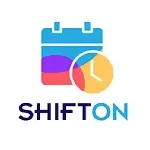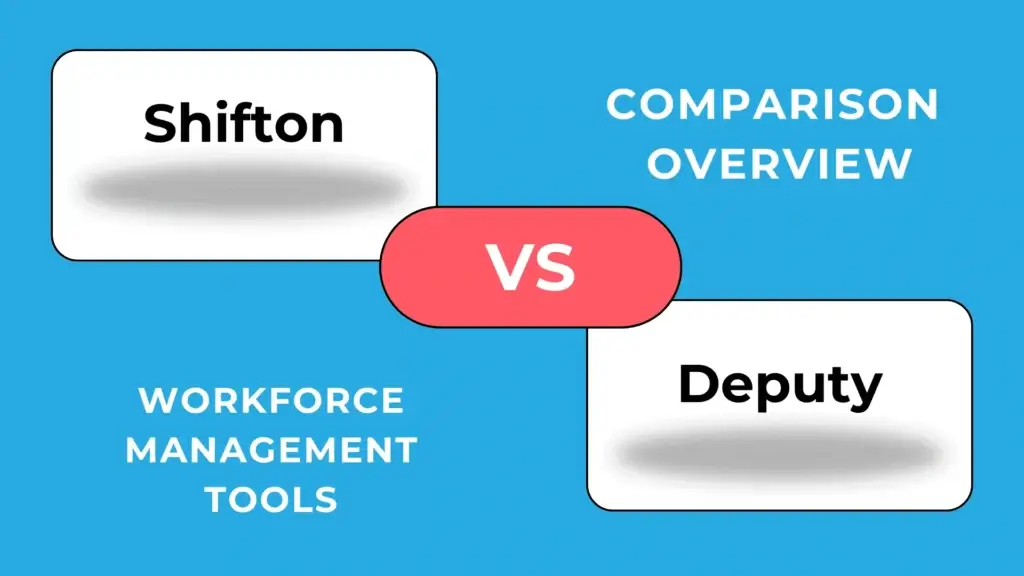More articles comparing different services are available in our section.
What is Shifton
 Shifton is a comprehensive workforce management tool tailored mainly for businesses in the service, retail, and hospitality sectors. Its primary aim is to simplify employee scheduling, enhance time tracking, and improve team communication.With Shifton, managers can effortlessly create and manage work schedules, accommodating employee availability and preferences to encourage a positive work environment. The platform allows employees to clock in and out using a user-friendly mobile app, ensuring accurate time tracking and reducing administrative overheads. Additionally, Shifton features built-in communication tools that facilitate interaction among team members, allowing for efficient updates and collaboration.Furthermore, Shifton provides reporting capabilities that offer insights into attendance, labour costs, and workforce productivity, enabling managers to make data-driven decisions. While it can integrate with various HR and payroll systems, Shifton is particularly favoured by small and medium-sized businesses looking for an intuitive and affordable solution to streamline their workforce management processes.
Shifton is a comprehensive workforce management tool tailored mainly for businesses in the service, retail, and hospitality sectors. Its primary aim is to simplify employee scheduling, enhance time tracking, and improve team communication.With Shifton, managers can effortlessly create and manage work schedules, accommodating employee availability and preferences to encourage a positive work environment. The platform allows employees to clock in and out using a user-friendly mobile app, ensuring accurate time tracking and reducing administrative overheads. Additionally, Shifton features built-in communication tools that facilitate interaction among team members, allowing for efficient updates and collaboration.Furthermore, Shifton provides reporting capabilities that offer insights into attendance, labour costs, and workforce productivity, enabling managers to make data-driven decisions. While it can integrate with various HR and payroll systems, Shifton is particularly favoured by small and medium-sized businesses looking for an intuitive and affordable solution to streamline their workforce management processes.What is Deputy
Deputy is workforce management software designed to streamline everyday operations for managers and employees alike. Primarily known as a scheduling app for teams, Deputy includes features like automated shift assignments, timesheet tracking, and notification systems for real-time shift changes. With Deputy, companies can manage shift coverage planning, handle break compliance, and maintain labour cost control.Deputy's versatility extends to industries like retail, hospitality, healthcare, and beyond. It offers cloud-based capabilities, meaning data syncing and staff roster management can be done on the fly. This employee management platform helps business owners better allocate human resources, adjust shifts based on demand, and reduce administrative tasks, ultimately allowing them to focus on strategic initiatives.Shifton vs. Deputy: Key Features
When it comes to Shifton vs. Deputy, both are strong solutions offering a wide array of scheduling and HR management solution functionalities. However, each platform comes with its unique highlights that cater to specific business needs.- Scheduling and Rostering
- Shifton excels at automating the scheduling process, helping teams quickly build weekly, monthly, or custom rosters.
- Deputy allows managers to create staff rosters in minutes and push real-time updates to employees.
- Time Tracking and Attendance
- Shifton's clock-in/clock-out system integrates seamlessly with attendance records for an accurate view of employee hours.
- Deputy offers a similar feature, ensuring labour compliance and logging time entries directly into timesheets for payroll.
- Mobile Accessibility
- Shifton's mobile app allows employees to start and end shifts, swap shifts, and submit requests for days off, holidays, or sick leave.
- Deputy's mobile app also supports location-based clocking and sends notifications.
- Workforce Management
- Shifton offers deep insights into labour costs and productivity, enabling data-driven decision-making.
- Deputy provides interactive dashboards for quick scheduling changes and real-time labour analytics.
Shifton vs. Deputy: Similarities
Despite the broad range of functionalities that Shifton vs. Deputy offer, they share some common ground in several areas:- Cloud-Based Scheduling ToolsBoth solutions utilise cloud-based scheduling tools to keep data accessible and up to date.
- Mobile-Focused ApproachBoth Shifton and Deputy have dedicated mobile apps that allow managers to edit schedules and employees to view or swap shifts while on the go.
- Notifications and AlertsBoth platforms send real-time alerts to employees for shift changes, time-off approvals, and shift coverage planning.
- Integration with Payroll and Other SystemsBoth solutions integrate with popular payroll, point-of-sale, and HR platforms, ensuring seamless data flow.
- Ease of OnboardingShifton and Deputy are relatively easy to set up, with user-friendly interfaces guiding you through the basics of staff scheduling system implementation.
Shifton vs. Deputy: Differences
While Shifton vs. Deputy share a common foundation, some critical differences assist potential users in making an informed decision:- Personalisation
- Shifton: Offers adaptable scheduling templates and advanced permission settings. You can set notifications, shift rules, and user roles according to your organisational structure.
- Deputy: While it also supports custom settings, it tends to offer preset configurations that may suit smaller businesses looking for plug-and-play features.
- User Interface
- Shifton: Focuses on a streamlined design with more direct navigation for shift planning. Users often praise its simplicity when creating a shift planning platform.
- Deputy: Provides a visually appealing dashboard, which might be more engaging but can pose a slight learning curve for new users.
- Industry Focus
- Shifton: Supports diverse industries like restaurants, healthcare, retail, and even call centres that need multi-location shift scheduling solutions.
- Deputy: Widely used in hospitality and retail but has gained traction in healthcare and corporate offices too.
- Scalability
- Shifton: Adapts to smaller teams and large enterprises, making it suitable as scheduling software for small businesses and larger companies alike.
- Deputy: Equally scalable but often preferred by mid-sized businesses looking to standardise scheduling across multiple sites.
Shifton vs. Deputy: Pros and Cons
When evaluating Shifton vs. Deputy, every business should consider the pros and cons in relation to their specific circumstances.| Platform | Pros | Cons |
|---|---|---|
| Shifton |
|
|
| Deputy |
|
|
Shifton vs. Deputy: Pricing
When you view Shifton vs. Deputy through the lens of cost, you'll find both platforms offer tiered packages to suit different budget ranges.- Shifton: Usually offers monthly plans based on the number of users. The tiers might include added benefits like support, advanced analytics, or specialised features for larger organisations.
- Deputy: Also provides per-user/per-month pricing. However, certain advanced features, such as comprehensive forecasting or specialised compliance features, may come at an additional cost.
Shifton vs. Deputy: Comparison Table
The following table distils the major points between Shifton vs. Deputy into an easily digestible format:| Criteria | Shifton | Deputy |
|---|---|---|
| Main Focus | Flexible shift scheduling solutions | Simplified scheduling with interactive dashboards |
| Customization | High (templates, roles) | Moderate (preset options) |
| Industry Suitability | Broad: Retail, Healthcare, Restaurants, Logistics | Broad but popular in Hospitality, Retail, Corporate |
| Integration | Key HR, payroll systems | Extensive third-party apps |
| Pricing Structure | Per user, monthly tiers | Per user, monthly tiers |
| Scalability | Ideal for small & large enterprises | Mid-sized and large businesses |
| Reporting & Analytics | Detailed; advanced add-ons | Comprehensive but tier-dependent |
5 Recommendations For Choosing Between Shifton vs. Deputy
Selecting between Shifton vs. Deputy can be simplified by following these five recommendations:- Assess Your Industry NeedsDifferent sectors have unique scheduling demands. Determine which solution addresses your industry's key challenges — like compliance or multi-location management.
- Evaluate Budget ConstraintsIdentify your monthly or annual budget and choose the plan that covers all essential features without inflating costs.
- Test IntegrationsWhether you rely on payroll software or point-of-sale systems, ensure the platform you pick has smooth integration pathways.
- Examine the Learning CurveConsider onboarding time. The easier the platform is to adopt, the faster your team can start using it effectively.
- Check ScalabilityIf you expect rapid growth, pick a platform that can adapt to new staff, more shifts, and possibly more locations.
Ten Questions You Must Ask When Choosing Between Shifton vs. Deputy
- Which platform better aligns with my specific industry requirements?
- How many staff will be using the system, and does the pricing model suit?
- Are the available integrations sufficient for my current and future workflow?
- Which platform offers quicker onboarding for managers and staff?
- Do I need advanced analytics or reporting abilities?
- How does each platform manage shift swaps and approvals?
- Are there any hidden costs or add-ons for features I consider essential?
- Which platform has a more intuitive mobile app for my staff?
- What level of customer support is provided, and at what cost?
- Do both solutions support expansions in other regions or locations?
Shifton vs. Deputy: Use Cases
Shifton vs. Deputy both have successful use cases across the United States, showcasing their adaptability in real-world scenarios.Shifton Use Cases
- Restaurant Chain in CaliforniaA multi-location restaurant needed advanced scheduling to handle rotating shifts, part-time staff, and seasonal demands. Shifton streamlined the process by automating daily rosters, allowing managers to quickly adapt to last-minute absences.
- Healthcare Clinic in New YorkWith a constant flow of patient appointments and regulatory compliance requirements, the clinic adopted Shifton for real-time shift changes and immediate notifications to on-call staff. This led to improved patient care and reduced overtime costs.
- Retail Startup in TexasA fast-growing retail store leveraged Shifton's online workforce management tools to unify scheduling across multiple outlets. The platform's robust analytics helped identify peak times, ensuring optimal shift coverage and minimal labour waste.
- Call Centre Automation in UkraineShifton streamlines call centre operations by automating agent scheduling, tracking real-time performance, and providing predictive analytics. With optimised shift coverage and instant reporting, managers can adapt to call surges quickly, ensuring excellent customer support and balanced workloads.
Deputy Use Cases
- Hospitality Group in FloridaDeputy's scheduling wizard helped the group manage multiple hotels, restaurants, and event venues. The staff roster management feature allowed managers to forecast demands based on historical data.
- Corporate Office in IllinoisA mid-sized software firm deployed Deputy for flexible scheduling. The platform's timesheet integration simplified payroll processing, enabling better workforce management software synergy with their existing systems.
- Nonprofit Organisation in WashingtonRelying heavily on part-time volunteers, this nonprofit benefited from Deputy's shift swap features and employee time tracking solutions. Automated notifications helped cut administrative overhead while increasing volunteer satisfaction.
Final Thoughts on Shifton vs. Deputy: Which Is Best For Business
In the end, deciding between Shifton vs. Deputy comes down to balancing features, cost, and user experience. Shifton may excel in offering customisable settings and in-depth reporting, while Deputy shines with its extensive integrations and established market presence. Both platforms rank highly as employee scheduling software and function well as a staff scheduling system. Consider your company's size, industry constraints, and growth trajectory to determine the perfect fit.More detailed information on the topic:
Shifton vs 7Shifts: Comparison Overview

 English (US)
English (US)  English (GB)
English (GB)  English (CA)
English (CA)  English (AU)
English (AU)  English (NZ)
English (NZ)  English (ZA)
English (ZA)  Español (ES)
Español (ES)  Español (MX)
Español (MX)  Español (AR)
Español (AR)  Português (BR)
Português (BR)  Português (PT)
Português (PT)  Deutsch (DE)
Deutsch (DE)  Deutsch (AT)
Deutsch (AT)  Français (FR)
Français (FR)  Français (BE)
Français (BE)  Français (CA)
Français (CA)  Italiano
Italiano  日本語
日本語  中文
中文  हिन्दी
हिन्दी  עברית
עברית  العربية
العربية  한국어
한국어  Nederlands
Nederlands  Polski
Polski  Türkçe
Türkçe  Українська
Українська  Русский
Русский  Magyar
Magyar  Română
Română  Čeština
Čeština  Български
Български  Ελληνικά
Ελληνικά  Svenska
Svenska  Dansk
Dansk  Norsk
Norsk  Suomi
Suomi  Bahasa
Bahasa  Tiếng Việt
Tiếng Việt  Tagalog
Tagalog  ไทย
ไทย  Latviešu
Latviešu  Lietuvių
Lietuvių  Eesti
Eesti  Slovenčina
Slovenčina  Slovenščina
Slovenščina  Hrvatski
Hrvatski  Македонски
Македонски  Қазақ
Қазақ  Azərbaycan
Azərbaycan  বাংলা
বাংলা 

